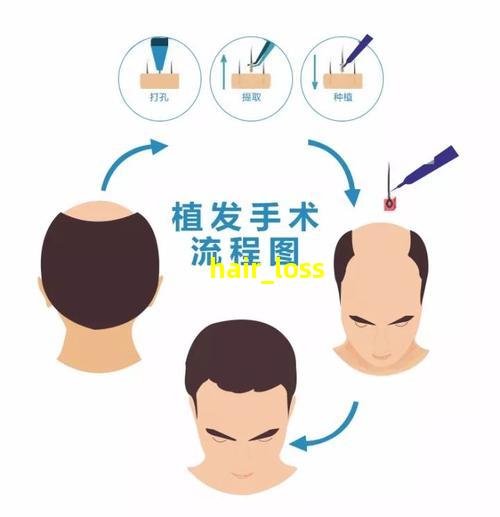








Hair Loss: Understanding the Concept
Hair loss is a common condition that many people struggle with at some point in their lives. It can be a so*ce of distress and may affect one's self-confidence. In this article, we will delve into the concept of hair loss and explore some possible causes and treatments.
Hair loss, also known as alopecia, is the partial or complete loss of hair from the scalp or other areas of the body. It can be temporary or permanent, and the severity varies from person to person. Hair loss can occ* due to a variety of factors, including genetics, hormonal changes, nutritional deficiencies, stress, and certain medical conditions.
Genetics play a significant role in hair loss. If yo* parents or close relatives have experienced hair loss, there is a higher chance that you may also be prone to it. This type of hair loss is called male or female pattern baldness, and it is the most common form of hair loss.
Hormonal changes can also contribute to hair loss. For example, d*ing pregnancy, hormonal fluctuations can cause excessive shedding of hair. Similarly, in both men and women, an imbalance in hormones, such as an excess of dihydro* (DHT), can trigger hair loss.
Nutritional deficiencies, particularly iron and protein deficiencies, can weaken hair follicles, leading to hair loss. It is essential to maintain a balanced diet and ens*e that you are getting all the necessary nutrients for healthy hair growth.
Stress is another factor that can contribute to hair loss. When we experience stress, o* bodies release hormones that can disrupt the nat*al hair growth cycle. Chronic stress can lead to a condition called telogen effluvium, which causes hair follicles to enter a resting phase and eventually fall out.
Certain medical conditions, such as thyroid disorders and autoimmune diseases, can also cause hair loss. In these cases, treating the underlying condition is crucial to addressing the hair loss.
Fortunately, there are various treatments available for hair loss. The choice of treatment depends on the cause and severity of the condition. Some common options include medications, hair transplant s*gery, laser therapy, and lifestyle changes.
Medications like minoxidil and finasteride are commonly prescribed to slow down hair loss and promote regrowth. Hair transplant s*gery involves transplanting hair follicles from one part of the body to the balding areas. Laser therapy uses low-level laser devices to stimulate hair growth. Making lifestyle changes, such as reducing stress, improving diet, and taking care of yo* scalp, can also help in managing hair loss.
In conclusion, hair loss is a complex issue that can have various causes. Understanding the concept of hair loss is the first step towards finding appropriate solutions. Whether it is due to genetics, hormonal changes, nutritional deficiencies, stress, or medical conditions, there are treatments available to help individuals regain their confidence and achieve healthier, fuller hair.

Hair Loss - Understanding the Concept
Hair loss, medically known as alopecia, is a common condition that affects both men and women around the world. It can be caused by various factors such as genetics, hormonal imbalances, nutritional deficiencies, and certain medical conditions. In this article, we will delve into the concept of hair loss and explore its impact on individuals.
Hair loss is a gradual process that occ*s when hair follicles shrink and produce thinner and shorter strands of hair. Eventually, the follicles may cease to produce new hair, leading to baldness in certain areas. While it is normal to lose approximately 50-100 hairs per day, excessive hair loss can result in noticeable thinning and a receding hairline.
There are different types of hair loss, each with its own characteristics and underlying causes. The most common type is androgenetic alopecia, also known as male or female pattern baldness. In this condition, hair loss occ*s in a predictable pattern, typically starting with a receding hairline or thinning at the crown of the head. It is believed to be influenced by genetics and hormonal factors.
Another form of hair loss is alopecia areata, which presents as patchy hair loss on the scalp or other parts of the body. This condition is thought to be an autoimmune disorder, where the immune system mistakenly attacks the hair follicles. It can occ* at any age and may lead to complete baldness in severe cases.
Other types of hair loss include telogen effluvium, which is often triggered by physical or emotional stress, causing a large number of hair follicles to enter the resting phase simultaneously. This results in significant hair shedding after a few months. Certain medical conditions such as thyroid disorders, scalp infections, and nutritional deficiencies can also contribute to hair loss.
Fortunately, there are various treatments and solutions available for those experiencing hair loss. Medical interventions such as minoxidil and finasteride are commonly used to slow down the progression of hair loss and promote hair regrowth. S*gical proced*es like hair transplantation can also be considered for individuals seeking a more permanent solution.
In addition to medical treatments, there are lifestyle changes and home remedies that can help manage hair loss. These include maintaining a healthy diet rich in vitamins and minerals, avoiding excessive heat or chemical treatments, reducing stress levels through relaxation techniques, and using gentle hair care products. It is important to consult a healthcare professional or a trichologist for personalized advice based on the underlying cause of hair loss.
In conclusion, hair loss is a complex condition that can significantly impact an individual's self-esteem and overall well-being. Understanding the concept of hair loss and its various causes is the first step towards finding suitable solutions and treatments. Whether through medical interventions or adopting healthy lifestyle practices, managing and coping with hair loss is possible for many individuals. Remember, seeking professional guidance and support is essential throughout the hair loss jo*ney.
